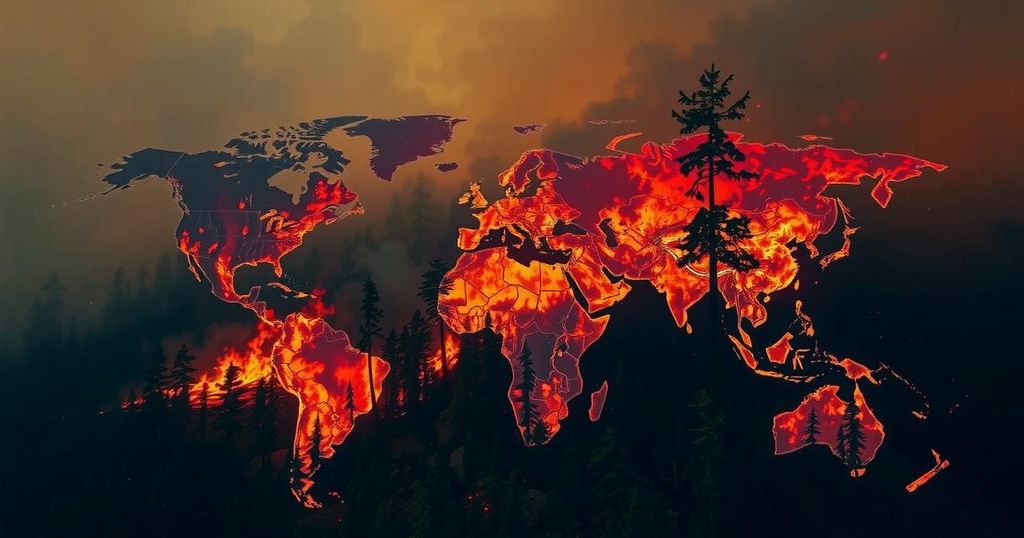Research Links Climate Change to Increasing Global Wildfires and Rising Health Impacts

Recent studies reveal a direct association between climate change and the increase in wildfires worldwide, with smoke-related deaths rising from under 669 annually in the 1960s to over 12,500 in the 2010s. While some regions, notably Africa, have seen declines in wildfire occurrence due to human activities, others, like California and Siberia, have experienced increases due to climate conditions. The research underscores the pressing need for effective climate action and wildfire management strategies.
Recent research has established a definitive connection between climate change and the escalating frequency and severity of wildfires globally, which has resulted in an alarming rise in smoke-related fatalities over recent decades. Two independent studies conducted by teams from Dalhousie University, along with institutions in Belgium, the UK, and Japan, have examined the impact of wildfires on human health and their increasing prevalence. Notably, the studies reveal a surge in wildfire smoke-related deaths, increasing from under 669 annually in the 1960s to approximately 12,566 per year by the 2010s. One of the studies, published in Nature Climate Change, assessed wildfire models accounting for climate change effects versus those that did not. The findings indicate notable increases in fire occurrence and intensity, particularly in vulnerable ecosystems such as African savannas, Australia, and Siberia. However, the research also identifies significant regional variations; while Africa accounts for approximately 70% of the global burn area, wildfires there have diminished due to increased human activity and land fragmentation that hinder fire spread. In contrast, regions like California and Siberia are experiencing rising fire incidents due to prolonged droughts and elevated temperatures attributed to climate change. Dr. Sian Kou-Giesbrecht, an associate professor at Dalhousie University and co-author of both studies, commented on the significance of the research, stating, “The study is important because it shows and quantifies the influence of climate change on increasing wildfires worldwide, especially given the impacts of wildfire on society and its feedback to climate change.” The researchers employed advanced modeling that integrated factors such as climate, vegetation, and population density. They emphasize that although human interventions like fire suppression and landscape management can mitigate wildfire impacts, they are often insufficient to counteract the effects of climate change during extreme weather years. Dr. Seppe Lampe, a climate scientist at Vrije Universiteit Brussel and a lead author of the study, noted, “What is striking is that in periods with low to moderate numbers of fires, direct human interventions have a large effect. However, in periods with many fires, the effect of climate change dominates, meaning that in these cases we lose control.” The simulations indicate a nearly 16% increase in global burned area attributable to climate change between 2003 and 2019 and a 22% increase in the likelihood of experiencing months with above-average burned areas. Furthermore, the proportion of wildfire smoke-related deaths attributable to climate change increased dramatically over the decades studied, with estimates rising from 1-3% in the 1960s to as much as 28% in the 2010s in various models. The highest mortality rates were observed in South America, Australia, Europe, and boreal forests in Asia. In summation, if current trends in climate change persist, researchers anticipate further significant increases in both the area affected by wildfires and the associated health impacts in the future. The findings underscore the urgent need for rigorous greenhouse gas emission reductions alongside effective landscape and wildfire management strategies to stabilize fire-related impacts on human life and ecosystems.
The phenomenon of wildfires has become increasingly prevalent due to rising global temperatures and changing climate conditions. This has initiated a wave of research aimed at understanding the multifaceted relationship between climate change and wildfires, particularly in how it affects both the environment and human health. Recent studies shed light on the severe consequences of this escalating issue, particularly with regards to smoke-related mortality, drawing attention to the critical need for effective interventions.
The recent research highlights the undeniable link between climate change and the significant rise in wildfire incidence and its severe health impacts, emphasizing the urgent need for comprehensive mitigation strategies. Despite some successes in fire management practices, the influence of climate change is overwhelmingly dominant in extreme fire years, exacerbating mortality rates associated with wildfire smoke. Immediate action to reduce greenhouse gas emissions and implement effective fire management strategies is imperative to mitigate the looming threat posed by wildfires to both human health and ecological systems.
Original Source: www.dal.ca







